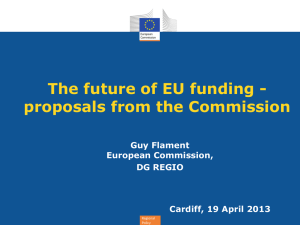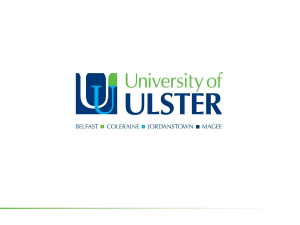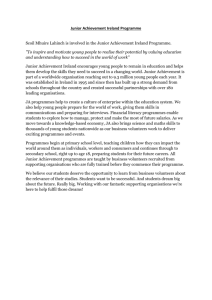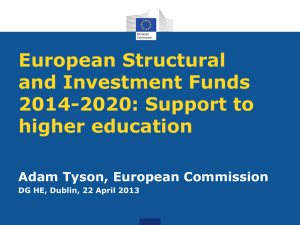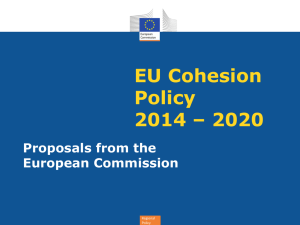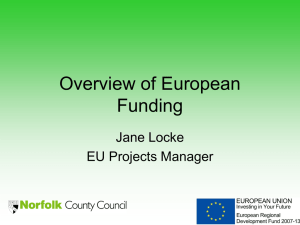EU Supplement July 2014 - Citizens Information Board
advertisement
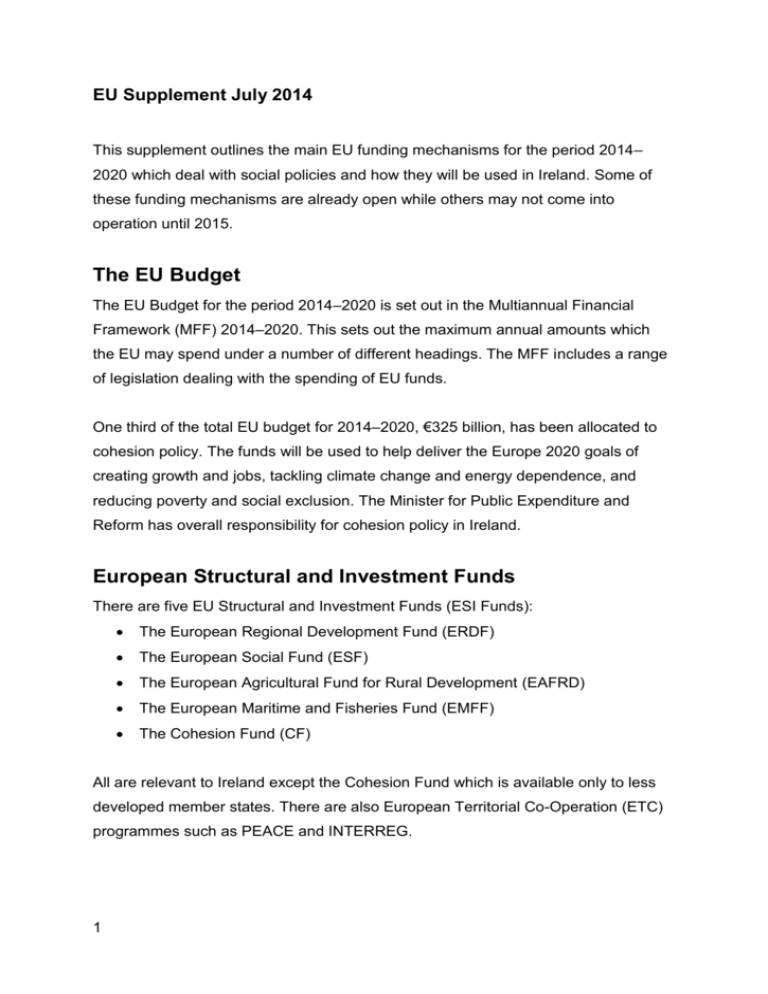
EU Supplement July 2014 This supplement outlines the main EU funding mechanisms for the period 2014– 2020 which deal with social policies and how they will be used in Ireland. Some of these funding mechanisms are already open while others may not come into operation until 2015. The EU Budget The EU Budget for the period 2014–2020 is set out in the Multiannual Financial Framework (MFF) 2014–2020. This sets out the maximum annual amounts which the EU may spend under a number of different headings. The MFF includes a range of legislation dealing with the spending of EU funds. One third of the total EU budget for 2014–2020, €325 billion, has been allocated to cohesion policy. The funds will be used to help deliver the Europe 2020 goals of creating growth and jobs, tackling climate change and energy dependence, and reducing poverty and social exclusion. The Minister for Public Expenditure and Reform has overall responsibility for cohesion policy in Ireland. European Structural and Investment Funds There are five EU Structural and Investment Funds (ESI Funds): The European Regional Development Fund (ERDF) The European Social Fund (ESF) The European Agricultural Fund for Rural Development (EAFRD) The European Maritime and Fisheries Fund (EMFF) The Cohesion Fund (CF) All are relevant to Ireland except the Cohesion Fund which is available only to less developed member states. There are also European Territorial Co-Operation (ETC) programmes such as PEACE and INTERREG. 1 ESI Funds are invested in all regions of the EU. The level of funding varies with the level of development and the national contribution (the co-funding requirement). It also varies with the level of development. In order to draw down the EU funding, each member state must meet a number of conditions. Each has to set out the objectives it wants to achieve and identify how it will measure progress towards those objectives. Partnership agreement Under the EU legislation governing these funds, member states are required to consult widely before drawing up and submitting a draft partnership agreement to the European Commission. This partnership agreement sets out the policy context in which the funds will be applied. Ireland’s draft partnership agreement was submitted to the European Commission on 22 April 2014. It is available at per.gov.ie. The Commission has three months to make observations on it. The partnership agreement should be adopted by the Commission within one further month if its observations on it have been taken into account. So, Ireland’s partnership agreement should be in place by 22 August 2014. Operational programmes The operational programmes set out the concrete actions that will be taken under the partnership agreement. Again, the Government is expected to consult widely before drawing these up. The operational programmes can cover the whole country or regions of the country. The operational programmes for the ESI funds must be submitted by 22 July 2014. The operational programmes for the ETC programmes must be submitted by 22 September 2014. The Commission has three months to make observations and the programmes should be adopted no later than six months after their submission. The operational programmes are then implemented by the member states. There are managing authorities for each programme. The operational programmes must, among other things, include a description of the specific actions to promote equal opportunities, and the contribution of the operational programme to the promotion of equality between men and women. A minimum of 20% of the ESF must be used towards objectives that address social 2 inclusion, combating poverty and discrimination. One of the objectives of the Rural Development Programme is promoting social inclusion, poverty reduction and economic development in rural areas. Information on the partnership programmes and operational programmes is available at bit.ly/1iyAMpb. How the funds apply in Ireland Ireland has been allocated €1.2 billion of funding from the European Regional Development Fund (ERDF) and the European Social Fund (ESF). This includes a special allocation of €100 million for the Border, Midlands and Western (BMW) region, €150 million for the PEACE programme and €68 million for the Youth Employment Initiative. Ireland’s allocation from the European Agricultural Fund for Rural Development (EAFRD) is €2.2 billion and €148 million is allocated from the European Maritime and Fisheries Fund (EMFF). There are two regions of Ireland for the purposes of EU funding – the Border, Midlands and Western (BMW) region, and the Southern and Eastern (SE) region. Both are classified as more developed regions. This is because their GDP is more than 90% of the EU average. Operational programmes in Ireland Ireland will have the following operational programmes for the ESI funds for the period 2014–2020: A national ESF operational programme part-funded by the ESF and managed by the Department of Education and Skills Two regional ERDF operational programmes for the BMW region and the SE region managed by the respective regional assemblies A rural development programme part-funded by the EAFRD and managed by the Department of Agriculture, Food and the Marine A fisheries programme part-funded by the EMFF and managed by the Department of Agriculture, Food and the Marine 3 There will also be operational programmes for the ETC funds as follows: The PEACE programme which will be implemented by the Special EU Programmes Body Ireland/Northern-Ireland/Scotland INTERREG programme which will be implemented by the Special EU Programmes Body Ireland/Wales INTERREG programme (South-East, Mid-East, Dublin regions only), which will be implemented by the Southern and Eastern Regional Assembly The Northern Periphery (implemented by the BMW Regional Assembly), North West Europe (implemented by the Southern and Eastern Regional Assembly) and Atlantic Area transnational programmes (implemented by the BMW Regional Assembly) European Regional Development Fund (ERDF) and European Social Fund (ESF) The total allocation for the ERDF and ESF operational programmes is €951 million of which 57% is allocated to the ESF. The BMW region will get €372 million of this. The allocations must be co-funded by the Irish Government at the rate of at least 50%; the ETC programmes must be at least 15% co-funded. The Irish Government has identified the following funding priorities for the ESF and ERDF: Promoting jobs and growth Combating unemployment and social exclusion Promoting research and development and ICT investment Promoting an environmentally friendly and resource-efficient economy Youth Employment Initiative Both regions in Ireland qualify for funding from the Youth Employment Initiative (YEI). The initiative in Ireland is allocated €68 million from the ESF. How exactly it will be used will be set out in the ESF operational programme. The YEI programme will be front-loaded for the years 2014 (€38 million) and 2015 (€30 million). 4 Urban development A minimum of 5% of the ERDF resources at national level must be allocated to integrated actions for sustainable urban development. It is intended to establish an Urban Development Fund in Ireland to meet this requirement. The Irish Government proposes to allocate more than 5% (€80 million) to the Urban Development Fund. This will be targeted at disadvantaged urban areas. The ERDF will provide half of this funding. Local authorities will provide the other half. Local authorities will bid directly for support of projects that contribute to the economic, social and environmental development of urban areas. European Agricultural Fund for Rural Development (EAFRD) The Department of Agriculture, Food and the Marine is responsible for the EAFRD. There are different co-funding rates under the different measures. The new Rural Development Programme will include a range of measures including the following: Green Low-Carbon Agri-Environment Scheme (GLAS) This is the new agri-environment scheme which is allocated €1.45 billion over the period 2014–2020. It will provide payments of up to €5,000 each for up to 50,000 farmers; it is expected that about 25,000 farmers will be accepted into the scheme in 2015. Farmers who take on more challenging environmental actions may get top-up payments of up to €2,000 a year under GLAS+. Areas of Natural Constraint The current payments under the Areas of Natural Constraint (ANCs) scheme (formerly the Disadvantaged Areas Scheme) will be continued until the reassessment of the areas covered by the scheme is concluded in 2018. Island farmers will get an additional top-up payment. Locally led agri-environment schemes There will be a €70 million allocation for locally led, targeted agri-environment schemes. Organic Farming Scheme 5 About €44 million is being allocated for the Organic Farming Scheme. There will also be a dedicated Capital Investment Scheme for the organic sector. LEADER The Department of the Environment, Community and Local Government has been allocated 7% (€153m) of the EAFRD for the delivery of LEADER measures. The level of co-funding for LEADER has not yet been decided. The precise projects to be supported will emerge from the development of local development strategies. It is expected that the main areas will be: Rural economic development/enterprise development/job creation incorporating rural tourism, enterprise development, broadband training and rural towns Social inclusion through building community capacity, training and animation Rural environment European Maritime and Fisheries Fund (EMFF) Ireland will receive €148 million from this fund in the period 2014–2020. This will be used to implement the new Common Fisheries Policy. It will support the fishing fleet, the development of the seafood processing sector, and the aquaculture industry. Other EU funding As well as the ESI funds, there is a range of EU programmes which provide funding for specific areas of activity. They operate differently from the ESI funds. Fund for European Aid to the Most Deprived (FEAD) The new Fund for European Aid to the Most Deprived (FEAD) has been agreed. The aim of the fund is to support the efforts of member states to help the people who have been worst affected by the on-going economic and social crisis. The fund has €3.8 billion for the period 2014–2020. Member states will be responsible for paying 15% of the costs of their national programmes with the rest coming from the fund. The fund will provide non-financial help including food, clothing and other essentials. Member states may decide how exactly they will use the fund. Help given must be 6 accompanied by social reintegration measures aimed at getting the recipients out of poverty. The programme may be delivered by government or by non-governmental organisations. The indicated allocation for Ireland is €3.5 million each year. The Department of Social Protection is drawing up the operational programme and will be responsible for implementing it. Programme for Employment and Social Innovation (EaSI) The Programme for Employment and Social Innovation (EaSI) has been agreed. It will have a budget of €920 million available for the 2014–2020 period. It will support innovative social policies and promote labour mobility, as well as facilitate access to microcredit and encourage social entrepreneurship. This programme integrates and extends the existing programmes: Progress: Programme for Employment and Social Solidarity EURES: European network of Public Employment Services European Progress Microfinance Facility This programme is managed directly by the European Commission. Link: bit.ly/1ndqpV0. Horizon 2020 The Horizon 2020 programme was described in the April 2014 issue of the EU Supplement. There is no specific allocation for each country but Ireland aims to access €1.25 billion from it. A Horizon 2020 high-level group, under the chairmanship of the Department of Jobs, Enterprise and Innovation, has been established. Its work includes identifying key areas of opportunity where Irish researchers, agencies and companies can maximise their participation. The highlevel group will monitor Ireland’s participation under the programme, as well as implementation of the national strategy. Programme for the Competitiveness of Enterprises and Small and Medium-sized Enterprises (COSME) 7 The new programme for the Competitiveness of Enterprises and Small and Mediumsized Enterprises (COSME) 2014–2020 has an overall budget of €2.23 billion. It is implemented in Ireland by Enterprise Ireland and the Enterprise Europe Network in Ireland. The aims of the programme include facilitating access to finance for small and medium-sized enterprises (SMEs). Link: bit.ly/1jShTut The Enterprise Europe Network provides information and business supports for SMEs. It is coordinated by Enterprise Ireland. Health programme The health programme was described in the April 2014 issue of the EU Supplement. The national focal point for this programme is based in the Health Research Board. Link: bit.ly/1rDgJ91 Europe for Citizens Programme Europe for Citizens aims to contribute to citizens' understanding of the EU and to foster European citizenship and improve conditions for civic and democratic participation at EU level. It includes support for town twinning. It is implemented in Ireland by the Institute of Public Administration. Website: ipa.ie LIFE programme The LIFE programme supports environmental and nature conservation projects throughout the EU. The 2014–2020 programme is now open for applications. Website: ec.europa.eu/environment/life/index.htm. The Department of the Environment, Community and Local Government has overall responsibility for the programme in Ireland. Rights, Equality and Citizenship Programme The Rights, Equality and Citizenship programme is managed directly by the European Commission. The 2014–2020 programme has the following objectives: 8 Promote non-discrimination Combat racism, xenophobia, homophobia and other forms of intolerance Promote rights of persons with disabilities Promote equality between women and men and gender mainstreaming Prevent violence against children, young people, women and other groups at risk (the Daphne programme) The programme for 2014–2020 will fund areas such as training activities, exchange of good practice and support for NGOs. It has a budget of €439 million. Link: bit.ly/1pBWgDi. Justice programme This programme, which is directly managed by the European Commission, promotes: Judicial cooperation in civil matters, including civil and commercial matters, insolvencies, family matters and successions Judicial cooperation in criminal matters Judicial training It has a budget of €378 million for the period 2014–2020. Link: bit.ly/1n7HQaL. EU Home Affairs funds The Asylum, Migration and Integration Fund (AMIF) focuses on migrant flows and the integrated management of migration. It supports actions addressing all aspects of migration, including asylum, legal migration, integration and return. Link: bit.ly/1qeMirS. The Internal Security Fund supports the implementation of the Internal Security Strategy and the EU approach to law enforcement cooperation, including the management of the EU's external borders. Link: bit.ly/IPU0VN. The Department of Justice and Equality is responsible for these funds in Ireland. Part of the funds are directly managed by the European Commission. 9
